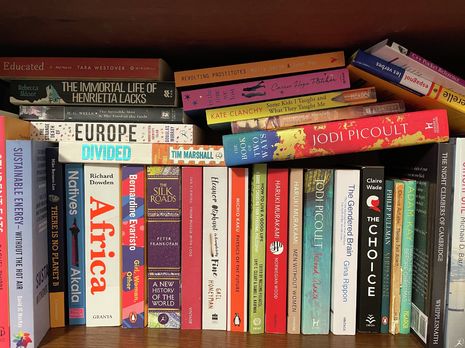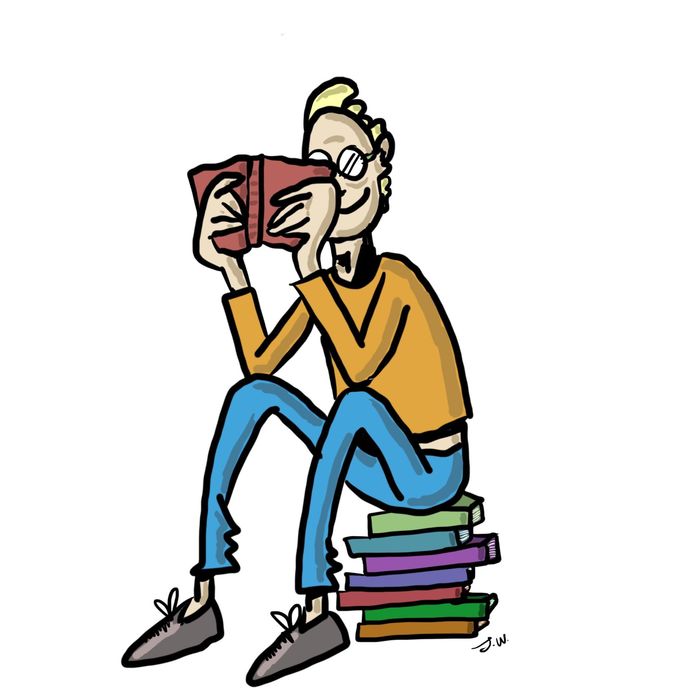Literary Imposter Syndrome vs My Love for Reading
“Escapism, excitement and a view into someone else’s world”: Amber De Ruyt reflects on her relationship with reading

I have a confession to make. A confession which, in an ideal world, wouldn’t be a confession at all but merely a statement of fact. I love Jodi Picoult. You may know her as the author of My Sister’s Keeper (adapted into a very dull film starring Cameron Diaz) or as the name on the cover of a multicoloured paperback in your mum’s bag. Her books are often described as ‘chick-lit’ (despite covering some pretty harrowing themes) and as a result, she is rarely taken seriously in the literary world. There is, of course, a wider feminist point to be made here about the idea of chick-lit being considered inferior, but that’s for another day. For now, I want to talk about the latest in a long series of my first world problems, one I’ve decided to call literary imposter syndrome.
Growing up, I could always be found with my nose stuck in a book. My parents encouraged it, although that might be because it was the most effective form of childcare before iPads. I liked to think of myself as a little Matilda and read everything I could find, from Malory Towers to Wuthering Heights, although the latter probably went a bit over my head at the age of nine.
“Reading, at its core, is about whatever you love it to be about.”
This meant that I was fairly ‘well read’ by the time I went to secondary school, since I’d read a lot of books and some of them happened to be well considered. However, I still didn’t fully understand what the phrase ‘well read’ really meant. From my perspective, the best thing about reading was how easily I could escape to an entirely different world from my living room. I was swept away from a train platform to Narnia with the Penvensies as powerfully as I was pushed into the streets of Paris with Fantine, yet my teachers would give Hugo’s words a nod and Lewis’ a sigh. From Snicket to Dickens, I just loved being taken to a land far from my own and I struggled to see why people thought some authors had the right to do that and some didn’t. To me, being ‘well read’ just meant reading something that made you feel well.
This brings me back to Jodi. Her writing is fast-paced, taking you from a hospital to a courtroom in a single page turn and using multiple POVs to carry you through the rollercoaster of her novels. By those standards, she gives me everything I want from a book: escapism, excitement and a view into someone else’s world. However, my arrival at Cambridge was quick to crush my ambition to read everything she’d ever written.
Within the first few days at college, I made the classic mistake of befriending an Engling. I spent a lot of time helping him sort out his books, almost all of them literary classics. Although I had read most of them, I immediately felt a wave of embarrassment as I thought of my own room’s bookshelves currently being piled high with Angela Carters and (you guessed it) Jodi Picoult. I thought I wouldn’t be taken seriously. The irony is that we’ve never actually run out of literary conversations and he has actively told me there is no need to worry about this, but we all know anxiety doesn’t work that way. The imposter syndrome kicked in, and I started wondering how I could call myself a Cambridge student if my kindle library looked like it was pulled straight out of Cosmopolitan.
This sense of fear solidified when my then friend, now boyfriend, saw a copy of House Rules by (wow I really am a broken record) Jodi Picoult on my desk and struggled to hold back a laugh. He just saw the red font and grabby tagline of “Your son is accused of murder. You fear he might be guilty. What would you do?” and thought it was just another piece of what he called ‘trashy fiction’. Since then he’s heard enough rants about how brilliant I think she is that he’s changed his tune. I just think at the time his tone came from a level of expectation of ‘a Cambridge bookworm’ I didn’t feel like I could live up to. After that, I kept War and Peace on my bedside table during term time and left my other reading behind closed doors. The truth is, I ended up enjoying Tolstoy less than I normally would, just because I felt like I was reading it because I should and not because I wanted to.
As with most good stories, however, mine has a happy ending. Once the first lockdown kicked in, I realised that the longer I spent worrying about organising my reading schedule around ‘feeling like a Cambridge student’, the less time I’d have to actually sit down and enjoy myself. I picked up the first book I could find and was whisked away on the winds of it without a care in the world. Reading, at its core, is about whatever you love it to be about. Whether that’s escapism, accomplishment or just comfort, you don’t need to adhere to anyone else’s standards to fulfil that love - now more than ever. Right now, I’m in Cambridge and have Revolting Prostitutes, Things Fall Apart and Second Glance (by Jodi, of course) on my bedside table. I look forward to devouring each and every one.
 News / Hundreds of Cambridge academics demand vote on fate of vet course20 February 2026
News / Hundreds of Cambridge academics demand vote on fate of vet course20 February 2026 News / Judge Business School advisor resigns over Epstein and Andrew links18 February 2026
News / Judge Business School advisor resigns over Epstein and Andrew links18 February 2026 News / University Council rescinds University Centre membership20 February 2026
News / University Council rescinds University Centre membership20 February 2026 News / Petition demands University reverse decision on vegan menu20 February 2026
News / Petition demands University reverse decision on vegan menu20 February 2026 News / Caius students fail to pass Pride flag proposal20 February 2026
News / Caius students fail to pass Pride flag proposal20 February 2026










